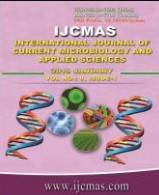


 National Academy of Agricultural Sciences (NAAS)
National Academy of Agricultural Sciences (NAAS)

|
PRINT ISSN : 2319-7692
Online ISSN : 2319-7706 Issues : 12 per year Publisher : Excellent Publishers Email : editorijcmas@gmail.com / submit@ijcmas.com Editor-in-chief: Dr.M.Prakash Index Copernicus ICV 2018: 95.39 NAAS RATING 2020: 5.38 |
Production of secondary metabolites from plant tissue culture has emerged as a promising and feasible option attracting the attention of scientists worldwide. Plant cell, tissue and organ cultures offer an attractive alternative for homogeneous, controlled production of secondary metabolites, throughout the year, especially when we take commercial demand into account. They not only facilitate the de novo synthesis of novel compounds, but also are able to produce compounds sometimes even in higher amounts than the intact plants. Many biotechnological strategies have been experimented for enhanced production of secondary metabolites from medicinal plants. Some of these include screening of high yielding cell lines, media modification, precursor feeding, elicitation, large scale cultivation in bioreactor system, hairy root culture, plant cell immobilization, biotransformation and many others. Some of the recent developments such as metabolic engineering of whole plants and plant cell cultures have been established as effective tools to increase metabolites yield. The use of genetic engineering tools and elucidation of pathways for secondary metabolism has provided the basis for the production of commercially acceptable levels of product. In view of commercial importance of the secondary metabolites as high value pharmaceutical compounds in recent years resulted in a immersive interest, in secondary metabolism, and particularly in the possibility to alter the production of bioactive plant metabolites by utilizing biotechnological tools. The plant cell culture technology provides sustainable option for production of plant pharmaceuticals and could be used for the large-scale production of metabolites.
 |
 |
 |
 |
 |